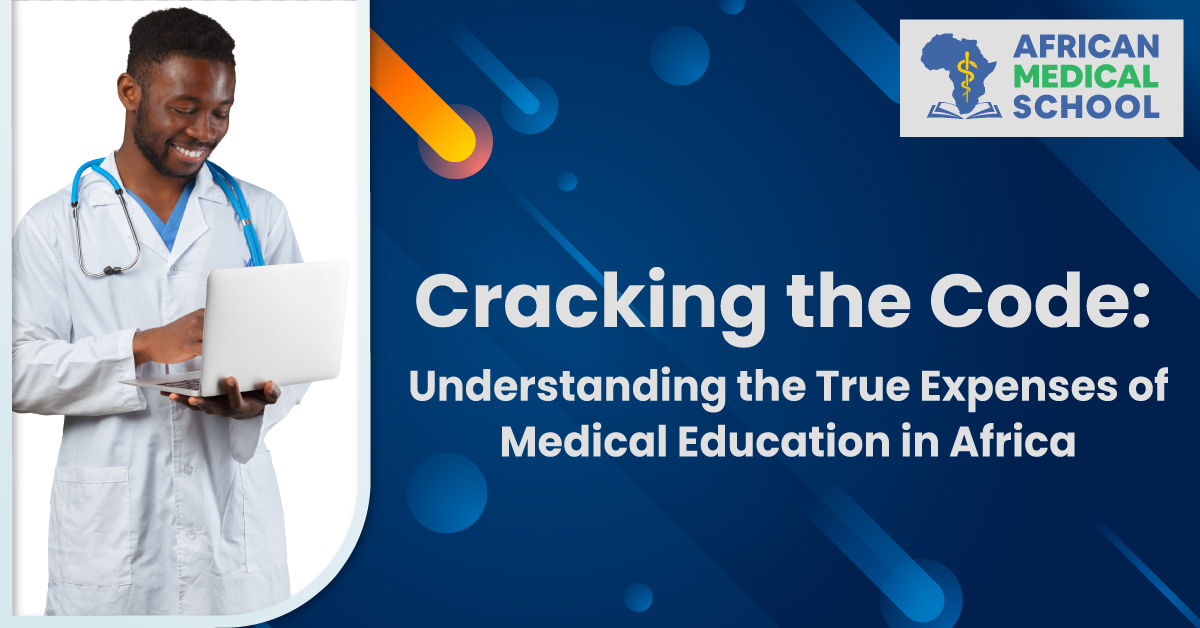|
|
Blog Summary
- Tuition Fees and Scholarships
- Cost of Study Materials
- Living Expenses
- Clinical Training and Internship Costs
- Additional Professional Development and Hidden Costs
- Opportunities for Financial Aid
- Government Initiatives
- Overcoming Financial Barriers
- Pursuing Medicine as a Passion
- Conclusion
- Frequently Asked Questions (FAQs)
Have you ever wondered what it takes to pursue a career in medicine in Africa? While therapy is undoubtedly rewarding, aspiring doctors must navigate a complex web of challenges, including the Cost of medical education. We will explore the actual expenses of medical education in Africa, shedding light on the financial burdens faced by aspiring doctors. By understanding these challenges, we can work towards creating a more accessible and inclusive healthcare system. So, let’s delve into the world of medical education in Africa and uncover the costs of pursuing a medical career.
Tuition Fees and Scholarships
Tuition fees for medical education in Africa vary significantly across institutions and countries. Medical schools often require substantial financial investments, making it crucial for aspiring doctors to plan their finances accordingly. However, it’s important to note that scholarships and financial aid opportunities exist to support talented individuals who may not have the means to afford medical education. These scholarships and grants can alleviate the burden of tuition fees and allow aspiring doctors to pursue their passion for medicine.
Cost of Study Materials
Aspiring medical students in Africa must also consider the Cost of study materials. These include textbooks, reference guides, anatomical models, and other essential resources necessary for their education. The expenses associated with study materials can quickly add up, burdening students already managing their tuition fees. Students must budget and prioritize their spending on study materials to ensure they have access to the necessary resources for their learning journey.
Living Expenses

In addition to tuition fees, Expenses include accommodation, meals, transportation, and utilities. The Cost of living can vary depending on the location and lifestyle choices of the student. Managing these living expenses alongside tuition fees and study-related costs can pose a challenge for many. It is crucial for students to carefully budget and seek out affordable living options to minimize the impact on their finances. Exploring options such as shared housing, meal planning, and utilizing public transportation can help reduce living expenses and make medical education more financially sustainable.
Clinical Training and Internship Costs
Clinical training and internships are essential to African medical education but come with costs. Students must often bear uniforms, equipment, transportation, and accommodation expenses during these rotations. These costs can add up and place an additional financial burden on aspiring doctors. Students must plan and budget accordingly to afford the necessary clinical training and internship expenses. Exploring options such as seeking subsidized housing, carpooling with fellow students, or applying for financial assistance programs can help alleviate some financial strain. African Medical School is a website that provides top medical university details in Africa. Future medical professionals can utilize this platform to explore cost-effective options for their clinical rotations and internships.
Additional Professional Development and Hidden Costs
To keep up with the latest advancements in their field, medical professionals must engage in ongoing professional development. Attending conferences, workshops, and seminars allows doctors to expand their knowledge and enhance their skills. However, these opportunities often come at a cost, adding to medical professionals’ financial costs.
Apart from the obvious expenses, there are hidden costs associated with medical education. These include examination fees, licensing fees, and other administrative charges. While individually, they may seem insignificant, these hidden costs can accumulate and put additional strain on the finances of medical students.
Opportunities for Financial Aid
Fortunately, various financial aid opportunities are available to support medical students in Africa. Medical universities in Africa offer various opportunities for financial aid to support students during their studies. Scholarships, grants, and loan programs exist to assist talented individuals who may need more financial resources to pursue their medical education. These financial aid options can help alleviate the burden of tuition fees and other related expenses, making medical education more accessible. Students can actively seek and apply for these opportunities through academic institutions, government programs, nonprofit organizations, and private foundations.
Government Initiatives
Governments in Africa are taking proactive steps to support medical education. Many countries have implemented various initiatives and programs to provide financial assistance to medical students. These government initiatives range from subsidized tuition fees and scholarship programs to loan forgiveness schemes and grants. By offering these forms of support, governments aim to ensure that talented individuals have equal access to quality medical education regardless of their financial backgrounds. Such initiatives promote inclusivity and diversity within the medical profession and contribute to building a robust healthcare system in Africa.
Overcoming Financial Barriers
Overcoming the financial barriers of African medical education requires a comprehensive and collaborative approach. Advocating for increased government support and investment in medical education can help create a more sustainable and accessible system. Collaboration between medical institutions and the private sector can foster partnerships that provide funding opportunities, internships, and mentorship programs. By working together, we can break down the financial barriers, empower talented individuals, and create a more inclusive healthcare system in Africa.
Pursuing Medicine as a Passion
Pursuing a career in medicine in Africa is not merely a choice but a passionate calling for many aspiring doctors. Despite the financial challenges and expenses, their unwavering dedication to positively impacting people’s lives fuels their determination. These people are strongly motivated by a profound desire to make valuable contributions to healthcare systems and enhance the welfare of their communities. Their passion pushes them to overcome financial obstacles and pursue their dreams relentlessly. They understand the sacrifices they must make and are willing to put in the hard work, long hours, and continuous learning that comes with a medical career.
By embracing medicine as a passion, aspiring doctors in Africa become catalysts for positive change, striving to create a healthcare landscape that provides equitable access to quality care.
Conclusion
Understanding the actual expenses of medical education in Africa is crucial for aspiring doctors and society. The financial burdens can be substantial, from tuition fees and study materials to living expenses and clinical training costs. However, it is heartening to know that there are opportunities for financial aid, scholarships, and government initiatives to alleviate these barriers. By actively seeking out these resources, aspiring doctors can pursue their passion for medicine and contribute to the healthcare landscape of Africa.
Together, let us strive for a future where every aspiring doctor in Africa can pursue their dreams and make a difference in the lives of others.



15 Comments. Leave new
Can you be more specific about the content of your article? After reading it, I still have some doubts. Hope you can help me.
Thanks for sharing. I read many of your blog posts, cool, your blog is very good. https://accounts.binance.info/pt-BR/register-person?ref=GJY4VW8W
Thinking of joining plus777vip. Anyone have experience with their VIP program? Is it worth it? Still, their regular game selection is pretty good! Browse it now in plus777vip
Yo, FB777applogin just hooked me up! Fast login and the app’s pretty slick. Definitely worth checking out if you’re trying to jump into the action quickly. Peep it here: fb777applogin
Can you be more specific about the content of your article? After reading it, I still have some doubts. Hope you can help me. https://accounts.binance.com/tr/register?ref=MST5ZREF
Your point of view caught my eye and was very interesting. Thanks. I have a question for you. https://accounts.binance.info/pt-PT/register-person?ref=KDN7HDOR
Alright, searching for ‘gà chọi c1.com’! Praying for a solid stream and awesome fights. Enjoy here gà chọi c1.com.
Looking for a site with a massive game collection? Afunjogo has it all! Slots, live casino, sports… tons of options! Check out afunjogo
B52dangnhap, eh? Nghe nói vào đây chơi là phê pha lắm đó nha. Anh em nào thích cảm giác mạnh thì quất liền đi, đừng bỏ lỡ cơ hội! Check it out b52dangnhap
Can you be more specific about the content of your article? After reading it, I still have some doubts. Hope you can help me. https://www.binance.info/kz/register?ref=K8NFKJBQ
Your point of view caught my eye and was very interesting. Thanks. I have a question for you.
I don’t think the title of your article matches the content lol. Just kidding, mainly because I had some doubts after reading the article.
Thanks for sharing. I read many of your blog posts, cool, your blog is very good.
Trong những năm đầu hoạt động, 188V chỉ tập trung vào việc xây dựng nền tảng kỹ thuật vững chắc và thu hút người chơi bằng các ưu đãi hấp dẫn. Sau một thời gian ngắn, nhà cái đã mở rộng danh mục trò chơi của mình, không chỉ giới hạn ở cá cược thể thao mà còn phát triển thêm nhiều trò chơi khác như poker, blackjack và slot games. TONY02-25O
Thank you for your sharing. I am worried that I lack creative ideas. It is your article that makes me full of hope. Thank you. But, I have a question, can you help me? https://www.binance.com/register?ref=JW3W4Y3A